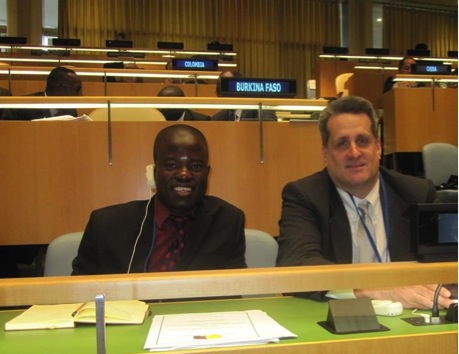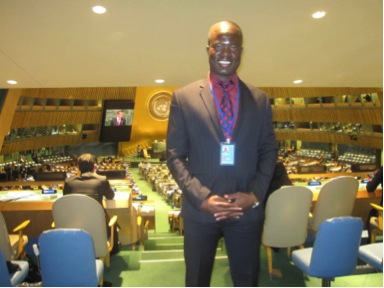Recently I attended the United Nations General Assembly Session in New York City September 23-26, 2014, with Dr. Rusty Butler, Associate Vice-President for International Affairs and Diplomacy, Dr. Geoffrey Cockerham, Associate Professor, Utah Valley University (UVU) and Mr. Aleksei Kolesov, Protocol Officer of the Permanent mission of Belarus to the United Nations.
First and foremost, I would like to take a moment to thank Utah Valley University’s faculty, staff, and students for sponsoring our trip to New York and encouraging engaged learning. I would like to express my personal gratitude to Dr. Geoffrey Cockerham, Dr. Rusty Butler, and Mr. Kolesov for all their efforts, time, and encouragement in making this high level visit happen.

Diba Soumaoro, member of UIMF and Dr. Geoffrey Cockerham, Associate Professor, History and Political Science, UVU during the session of the U.N. General Assembly
On Tuesday September 23, 2014, general debates of the United Nations (UN) General Assembly’s Sixty-Ninth Session opened at their headquarters in New York City in the presence of more than one hundred-thirty Heads of States, Ministers, and other high officials. The President of the General Assembly was His Excellency Mr. Sam Kahamba Kutesa, Minister of Foreign and Affairs of Uganda. The main theme of the session was, “Delivering on and Implementing Transformative Post-2015 Development Agenda.” In addition, delegates also discussed urgent crises situations taking place because of the conflicts in Ukraine, South Sudan, Syria, Iraq, Palestine, and Israel along with the Ebola virus outbreak in West Africa especially the epidemics in Guinea, Liberia, and Sierra Leone.
As an International Relations’ student, this conference was one of my favorite international forums in my life. I hope to get more chances to participate in the future in gatherings at such a high level. I really enjoyed my time at the United Nations and learned a lot about global issues, the importance of effective public speaking, leadership, multicultural and diplomacy skills, and methods of problem solving among other things. I was also able to make many new friends. In my view, participating in the session of the United Nations General Assembly was like reading 193 books with each country representing a book with their own unique chapters. During the UN session you can get credible information and knowledge from presentations and interactions with higher-level officials such as presidents, prime ministers, ministers of foreign affairs, and ambassadors in the 193 members’ states of the UN. You can also learn the prospects and visions of each country in respect to global issues.

Diba Soumaoro, member of UIMF, UVU during the session of the U.N. General Assembly
Indeed, the United Nations is working on complex issues of our contemporary world and the people around the globe are waiting for long-term solutions from them. Still many people are pessimistic about the UN when it is not able to achieve its fundamental goals, which are to maintain international peace and security, to encourage international cooperation, and to promote human rights and democracy around the world.
The conference allowed for great learning and the experience was truly a pleasure while listening to statements of the world leaders studying their rhetorical skills and abilities to appeal to the audiences, in addition to their recommendations to solve various global problems. I also had a wonderful experience from studying their behavior, cultural and religious habits during the session. Overall, I think the session was very productive.
I recommend my fellow students at UVU to enroll in the Model United Nations class before deciding to participate in such a high level session at the United Nations because of the need to acquire basic knowledge about principles and goals of the United Nations. After that students will be able to complement learning theories in class with practical experiences during the real session of the United Nations General Assembly. Participation at the session has opened my mind, taught me how to interact with diverse cultures, and how to develop critical thinking. I also may say without hesitation, that attending the UN’s General Assembly provided me with skills and opportunities, which will be impossible to acquire in the classroom. For example, I saw many world leaders in person, met various international officials, and people you’d only meet at the United Nations. Additionally, my visit to the United Nations has encouraged me to study within my disciplines much harder than I did before in order to achieve my dreams of working at the United Nations, and to be a successful diplomat and ambassador for my country.
Utah Valley University should continue its support of this project as one of the best methods of engaged learning for students. It will definitely help students achieving a Political Science degree to learn more about their future careers, to develop professional skills, build relationships and to network with important people, and to find many other opportunities in order to achieve their dream. Whatever it might be such as, to work at the United Nations or international institutions dealing with development. This project and visit to the UN will help many UVU students to learn in a practical way global politics and realities, which they’ve been taught in classes. UVU is fortunate to have Dr. Rusty Butler, who contributes his energy, resources, and many years of personal efforts in building connections for UVU faculty and students with diplomatic missions of many nations accredited under the UN over the years. Thanks to his passions, hard work, and dedication UVU students have a great opportunity to be a part of the UN activities and to learn intercultural awareness through making friends in the international arena.
Attending the United Nations General Assembly Conference has helped me learn about strengths, concerns, and positions on global issues for many nations around the world, challenges in their development as sovereign and independent nations and members of the international community. I also learned that in order to be a good diplomat, I have to develop skills of being an effective public speaker, multilingual, well educated, and competent. I noticed that many diplomats were multilingual except those from the United States. I think that it will be great if more people in this wonderful country learned several languages, so they’d be polyglots. I think that knowledge of languages helps in developing friendships and making people more comfortable.
In Closing, I’d like to say that the United Nations is a great international organization that works for maintaining peace and security in the world and encouraging global cooperation. I hope one day I can work with the UN to help solve complex global issues.
Djiba Soumaoro, UVU student, member of UIMF

